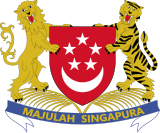
Back رئيس سنغافورة Arabic رئيس سينجابوره ARZ Presidente de Singapur AST Présidén Singapura BAN President de Singapur Catalan Präsident (Singapur) German Anexo:Presidentes de Singapur Spanish رئیسجمهور سنگاپور Persian Singaporen presidentti Finnish Président de la république de Singapour French
| President of the Republic of Singapore | |
|---|---|
 Presidential coat of arms | |
 | |
since 14 September 2023 | |
| Head of state of the Republic of Singapore | |
| Style |
|
| Type | Head of state |
| Residence | The Istana |
| Appointer | Parliament (1965–1991) Direct election (1991–present) |
| Term length | Six years, renewable |
| Precursor | Yang di-Pertuan Negara of Singapore |
| Formation | 9 August 1965 |
| First holder | Yusof Ishak |
| Deputy | Chairman of the Council of Presidential Advisers |
| Salary | S$1,540,000 annually |
| Website | Official website |
| This article is part of a series on |
 |
|---|
|
|
The president of the Republic of Singapore[a] is the head of state of Singapore. The president represents the country in official diplomatic functions and possesses certain executive powers over the Government of Singapore, including the control of the national reserves and the ability to revoke and appoint public service appointments.
After Singapore achieved full internal self-governance from the British Empire in 1959, the ceremonial office of the Yang di-Pertuan Negara (lit. "Lord of the State") was created. The office was later succeeded by the President of Singapore after Singapore's independence in 1965. The initial role of the president was largely ceremonial and symbolic, carrying residual powers, but the role was later vested with some executive power which includes the reserve power to veto certain bills, most notably in relation to the country's reserves as a check and balance process, as well as to revoke and appoint public service appointments among other powers listed in the Constitution.
Prior to 1991, the president was appointed by Parliament. A constitutional amendment was made that year to allow for the president to be directly elected by a popular vote, which was subsequently first held in 1993. Singapore follows a non-executive model of the Westminster parliamentary system whereby the president is not the head of government but rather the head of state. These powers are instead vested in the Cabinet, led by the prime minister. Another constitutional amendment was made in 2016, that allows for a presidential election to be reserved for an ethnic community in Singapore if no one from that community had been president for the previous five presidential terms.[note 1]
The president has far-reaching formal obligations and duty to act above party politics. Under the Constitution, the president must be a Singaporean citizen, non-partisan and elected by a popular vote. The incumbent president is Tharman Shanmugaratnam, who took office on 14 September 2023 after being duly elected in the 2023 presidential election with 70.41% of the vote.
Cite error: There are <ref group=lower-alpha> tags or {{efn}} templates on this page, but the references will not show without a {{reflist|group=lower-alpha}} template or {{notelist}} template (see the help page).
Cite error: There are <ref group=note> tags on this page, but the references will not show without a {{reflist|group=note}} template (see the help page).
